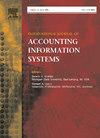Adaptive structural audit processes as shaped by emerging technologies
IF 6
3区 管理学
Q2 BUSINESS
International Journal of Accounting Information Systems
Pub Date : 2025-01-29
DOI:10.1016/j.accinf.2025.100735
引用次数: 0
Abstract
This study investigates how audit firms integrate emerging technologies to transform traditional audit methodologies and enhance audit quality. Using a qualitative research approach, the findings highlight that centralized audit platforms streamline documentation, promote knowledge sharing, and facilitate more effective internal reviews. Advanced Data Analytics (ADAs) such as the General Ledger (GL) Analyzer, process mapping technologies, and data visualization platforms complement professional judgment and skepticism, ensuring that human expertise remains central to the audit process. However, regulatory lag and dual data governance frameworks challenges hinder the seamless adoption of data-centric audit practices. This study emphasizes the importance of audit-data team collaboration for managing large datasets, ensuring data quality, and mitigating the risks of noisy data and false positives. Scalable audit tools are essential to serve a broad client base while retaining the flexibility to address client-specific risks. The Adaptive Audit Ecosystem (AAE) is introduced as a theoretical contribution, conceptualizing the interaction between technology, human expertise, governance structures, and regulatory requirements. The AAE illustrates how emerging technologies augment traditional practices while preserving essential audit principles, such as professional skepticism, judgment, independence, and accountability. This study concludes by presenting a future research agenda within the People, Process, Technology, and Governance (PPTG) framework.
由新兴技术形成的适应性结构审计流程
本研究探讨审计事务所如何整合新兴技术,以改变传统的审计方法,提高审计质量。通过使用定性研究方法,研究结果强调了集中审计平台简化了文档,促进了知识共享,并促进了更有效的内部审查。高级数据分析(ADAs),如总账(GL)分析器、过程映射技术和数据可视化平台,补充了专业判断和怀疑,确保了人类专业知识仍然是审计过程的核心。然而,监管滞后和双重数据治理框架的挑战阻碍了以数据为中心的审计实践的无缝采用。本研究强调了审计数据团队协作对于管理大型数据集、确保数据质量以及降低噪声数据和误报风险的重要性。可伸缩的审计工具对于服务于广泛的客户基础,同时保持解决客户特定风险的灵活性至关重要。适应性审计生态系统(AAE)作为一项理论贡献被引入,将技术、人类专业知识、治理结构和监管要求之间的相互作用概念化。AAE说明了新兴技术如何增强传统实践,同时保留基本的审计原则,如专业怀疑、判断、独立性和问责制。本研究的结论是在人员、过程、技术和治理(PPTG)框架内提出未来的研究议程。
本文章由计算机程序翻译,如有差异,请以英文原文为准。
求助全文
约1分钟内获得全文
求助全文
来源期刊
CiteScore
9.00
自引率
6.50%
发文量
23
期刊介绍:
The International Journal of Accounting Information Systems will publish thoughtful, well developed articles that examine the rapidly evolving relationship between accounting and information technology. Articles may range from empirical to analytical, from practice-based to the development of new techniques, but must be related to problems facing the integration of accounting and information technology. The journal will address (but will not limit itself to) the following specific issues: control and auditability of information systems; management of information technology; artificial intelligence research in accounting; development issues in accounting and information systems; human factors issues related to information technology; development of theories related to information technology; methodological issues in information technology research; information systems validation; human–computer interaction research in accounting information systems. The journal welcomes and encourages articles from both practitioners and academicians.

 求助内容:
求助内容: 应助结果提醒方式:
应助结果提醒方式:


